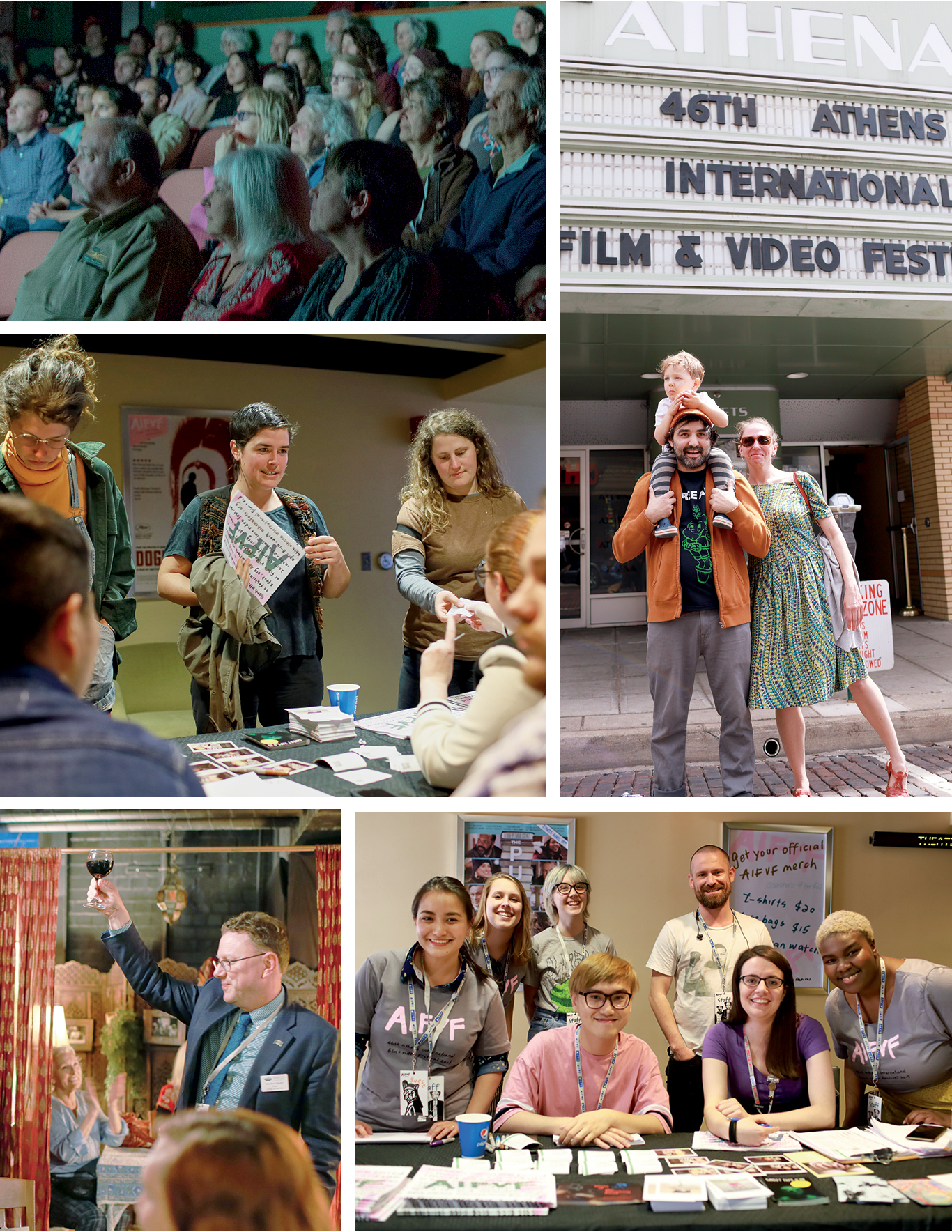AIFVF: Athens Film Fest Lights the Dark
On a Wednesday evening in early May 2019, David Colagiovanni, director of the Athens Center for Film and Video and the Athens International Film and Video Festival (AIFVF), sits in a corner patio booth at Jackie O’s, a favorite Uptown Athens brew pub. The atmosphere is bright, warm, full of movement, and filled with a din of overlapping voices. The vibe contrasts with the screening room where he and graduate students in film studies spent so much of the past year preparing for the 46th annual AIFVF.
In mid-April their efforts were kicked into overdrive as the festival began, bringing filmmakers from around the world to Athens and hundreds of films and videos to the screens of the Athena Cinema over the course of a saturated seven days. Now, just two and a half weeks after the final credits rolled, the last after-party came to an end, and the final cinephile drifted home to finally close their eyes, the group sits in the sun, slightly worn and just beginning to catch up on sleep but still glowing from the experience.
The making of a film fest
The vast amount of labor performed by these film studies students is, of course, just a portion of what the AIFVF requires. Ohio University School of Film MFA students also help, and David will celebrate with them separately. And then there are the volunteers, who help ensure the AIFVF’s guests are well fed, rested, and have places and events where they can connect and network with one another and with School of Film students. Colagiovanni, the students, and the volunteers are motivated by nothing if not love of the medium.
Every day of the festival, attendees can choose among hundreds of films and videos, including shorts organized into thematic blocks like “Our Labor,” “Step by Step,” and “Eye in the Sky.”
Yet, the 258 films and videos shown in 2019 reflect a fraction of the total number of entries. Beginning in August and stretching into early December, more than 2,300 were received, including a couple hundred on the first day alone. In 2019, students screened a quarter of these, Colagiovanni estimates, while regular screeners within a specific category might have viewed 30 to 40 percent. Colagiovanni himself watches some 90 percent of all entries, he says.
“When I’m at the height of screening, in December, January, and February,” he says, “when the schedule needs to be finished and programming set up, I’ll do 12 hours a day, including weekends.”
The aftermath of these screenings plays out on an industrial-sized table Colagiovanni keeps in his office. The table starts out void of anything save for pens and a stack of blank index cards. Then, each entry receives its own card with title, category, and a few screening notes. The cards for promising entries are spread out on the table as the screenings progress. As more and more cards populate the tabletop, they are organized into potential screening blocks, which are then named. At the same time, entries are constantly being watched, watched again, then re-watched.
“It’s all very active,” Colagiovanni says. “Once cards are on the table, no one touches or moves anything casually.” Colagiovanni has organized the festival since the summer of 2015, when he took over from Ruth Bradley, director for the previous 28 years. Since the AIFVF was founded in 1974, it’s achieved an enviable reputation as one that supports cinema from underground and marginalized populations.
“There’s lots of balancing,” Colagiovanni says. “We don’t want to just play one type of film. We’re an international festival and we have lots of ideas [that] come up. We want to let the films themselves dictate what’s shown.” If the festival does have a conceptual grounding, it’s a commitment to experimental, non-industry driven productions, Colagiovanni says. “We’re not anti-corporate,” he adds with a smile.
“They just don’t really like us.”
Colagiovanni describes the festival as “one of the best parts of living in Athens.” In practice, the festival seems to reflect much of what distinguishes the city: fierce independence, DIY-organization, commitment to a wide array of cultural perspectives, and an ongoing thread of experimentation. Local restaurants and venues recognize this through sponsoring daily lunches and coffee for the filmmakers and School of Film students, hosting after-parties, and, in the case of Jackie O’s and Little Fish Brewing Company, located on the edge of town, brewing especially made AIFVF beers and serving them up during the fest week.
Back on the patio, Colagiovanni and the students enter into a lively debate about individual selections at this year’s festival for what’s likely the hundredth time. They share stories of meeting directors who traveled thousands of miles—from places as far away as Albania—to attend AIFVF and relive the anxiety of having to fix flat tires and stop cars from being towed. And then, inevitably, the conversation turns to next year. Decisions need to be made, and there are pros and cons of each. As the light fades and the patio quiets down, the group is back at work, bringing the 47th AIFVF into view.
Learn More At athensfilmfest.org
